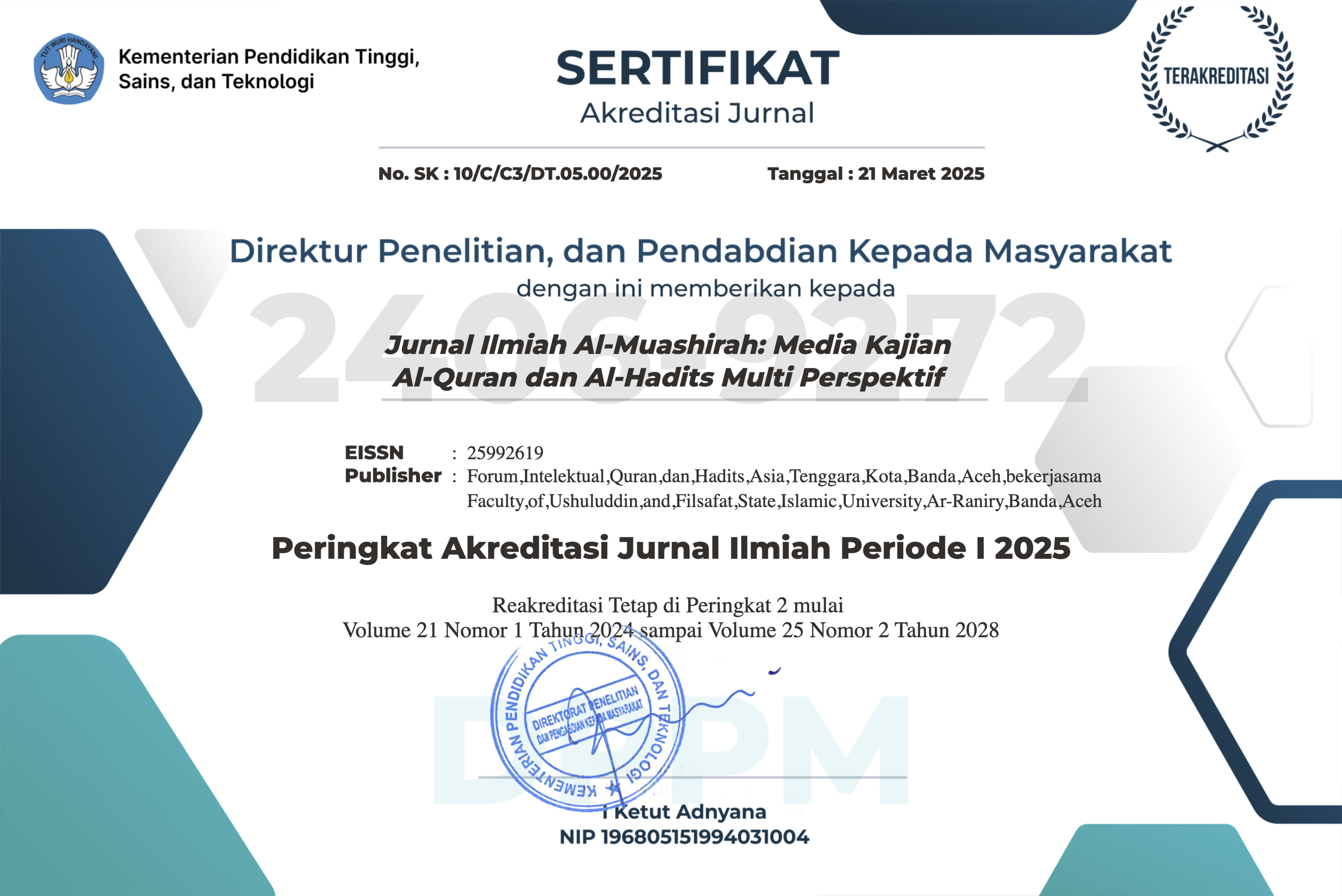Pengarusutamaan Gender dalam Penafsiran Al-Qur’an Menurut Amina Wadud Muhsin
DOI:
https://doi.org/10.22373/jim.v19i2.13522Keywords:
hermeneutika, gender, al-Qur`an, Amina WadudAbstract
Islam is a just religion. Justice covers all levels and groups of people, whether male or female, young or old, everything has been regulated according to its portion. Islam has honored women and made them equal to men in terms of worship, work, and rituals to draw closer to Allah. But in reality, some of these things are not really found in the facts of life. In conducting this search, the researcher used the thematic-analytical method by focusing the search on Amina Wadud's hermeneutics. From this search, the researcher found that Amina Wadud's interpretation method was a form of adoption of Fazlurrahman's hermeneutics. The difference between the two lies in the focus of the study and the perspective of the interpreter in which in this case the focus of Amina Wadud's study is on gender verses with Amina Wadud's perspective as a woman. From the research, it can be understood that Amina Wadud hopes that efforts to interpret the verses of the Qur'an, especially those relating to women, must be understood holistically because from a holistic method an interpretation of the Qur'an will be obtained which has meaning and content in harmony with the context of modern life.
ABSTRAK
Islam merupakan agama yang adil. Keadilan tersebut mencakup segala tingkatan dan golongan manusia baik itu laki-laki atau perempuan, muda maupun tua, segalanya telah diatur sesuai porsinya. Islam telah memuliakan perempuan dan menjadikan posisinya sama dengan pria dalam hal beribadah, bekerja, dan ritual-ritual untuk mendekatkan diri pada Allah. Namun pada kenyataannya, beberapa hal tersebut tidak benar-benar ditemukan dalam fakta kehidupan. Dalam melakukan penelusuran ini, peneliti menggunakan metode tematik-analitis yaitu dengan memfokuskan penelusuran terhadap hermeneutika Amina Wadud. Dari penelusuran ini peneliti menemukan bahwa metode interpretasi Amina Wadud merupakan bentuk adopsi dari hermeneutika Fazlurrahman. Perbedaan antara keduanya terletak pada fokus kajian dan perspektif interpreter yang mana dalam hal ini fokus kajian Amina Wadud adalah ayat-ayat gender dengan perspektif Amina Wadud sebagai perempuan. Dari penelitian, dapat dipahami bahwa Amina Wadud mengharapkan upaya penafsiran terhadap ayat al-Qur`an terutama yang berkaitan dengan perempuan harus dipahami secara holistik karena dari metode holistik akan diperoleh interpretasi al-Qur`an yang mempunyai makna dan kandungan selaras dengan konteks kehidupan modern.
Downloads
References
Al-Qattan, Manna Khalil. Studi Ilmu-Ilmu al-Qur`an. Terj. Mudzakir As. Bogor: Litera AntarNusa. 2012.
Al-Zuhaili, Wahbah. al-Qur`an Menjawab Tantangan Zaman. Terj. Syarif Hade Masyah. Jakarta: Mustaqiim. 2002
Bisri, Cik Hasan. dkk. Mengerti Qur`an: Pencarian Hingga Masa Senja 70 tahun Prof. Dr. H. A. Chozin Nasuha. Bandung: Pusat Penjaminan Mutu dan Pascasarjana UIN Sunan Gunung Djati. Tt.
Mutrofin. Kesetaraan Gender dalam Pandangan Amina Wadud dan Riffat Hassan. Tasawuf dan Pemikiran Islam. Vol. 3 (1). 2013.
Rahtikawati, Yayan. dan Dadan Rusmana. Metodologi Tafsir al-Qur`an: Strukturalisme, Semantik, Semiotik, dan Hermeneutik. Bandung: Pustaka Setia. 2013.
Setiawan, M. Nurkhalis. dkk. Upaya Integrasi Hermeneutika dalam Kajian Qur`an dan Hadis: Teori dan Aplikasi. Yogyakarta: Lembaga Penelitian UIN Sunan Kalijaga. 2011.
Setyawan. Cahya Edi. Pemikiran Kesetaraan Gender dan Feminisme Amina Wadud tentang Eksistensi Wanita dalam Kajian Hukum Keluarga. Jurnal Pemikiran Islam. Vol. 3 No. 1, 2017.
Umar, Nasaruddin. Kesetaraan Gender dalam al-Qur`an. Jakarta: Paramadina. 1999.
Wadud, Amina. Quran menurut Perempuan: Meluruskan Bias Gender dalam Tradisi Tafsir. Terj. Abdullah Ali. Jakarta: Serambi Ilmu Semesta. 2001.
Downloads
Published
Issue
Section
License
Authors who publish in Jurnal Ilmiah Al-Mu'ashirah agree to the following terms:
- Authors retain copyright and grant the journal right of first publication with the work simultaneously licensed under a Attribution-ShareAlike 4.0 International (CC BY-SA 4.0) License that allows others to share the work with an acknowledgment of the work's authorship and initial publication in this journal.
- Authors are able to enter into separate, additional contractual arrangements for the non-exclusive distribution of the journal's published version of the work (e.g., post it to an institutional repository or publish it in a book), with an acknowledgment of its initial publication in this journal.
- Authors are permitted and encouraged to post their work online (e.g., in institutional repositories or on their website) prior to and during the submission process, as it can lead to productive exchanges, as well as earlier and greater citation of published work (See The Effect of Open Access).













